Daily Living Aids
Family and Caregiver Support - Navigating Challenges
Caregiving is a crucial yet challenging role. Whether it’s the support of an aging parent, a spouse with chronic illness, or a loved one with special needs, being a caregiver can be a deeply emotional and physically demanding experience. As a family member or caregiver, you’re responsible for someone’s well-being and navigating a landscape that can sometimes feel overwhelming.
In this blog, we’ll explore the importance of family and caregiver support, the challenges caregivers face, and some practical tips to help you care for both your loved one and yourself.
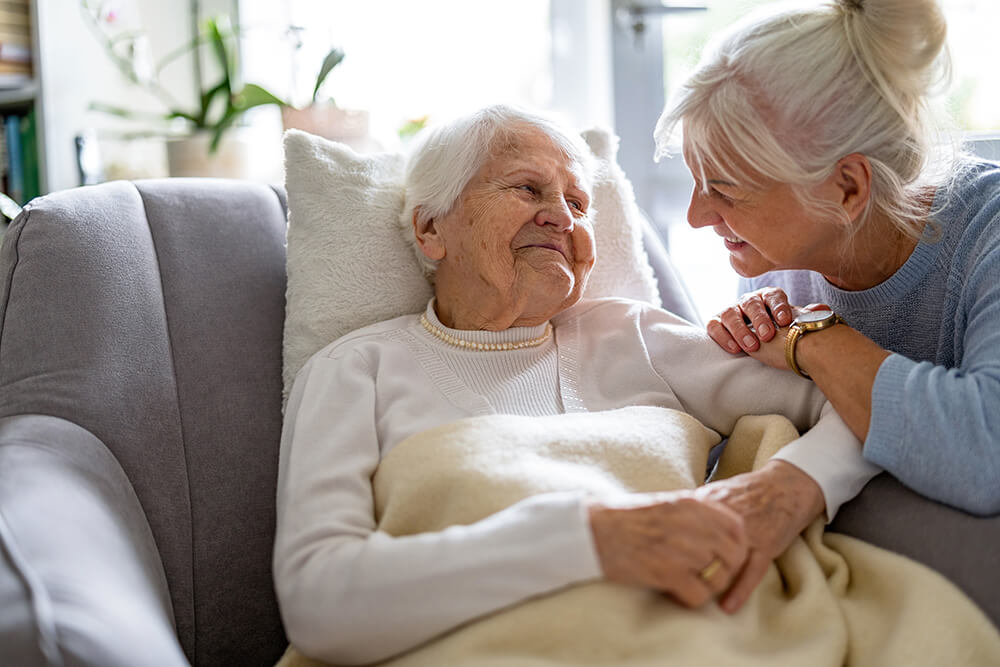 The Importance of Family and Caregiver Support
The Importance of Family and Caregiver Support
Family and caregiver support are the foundations of a loved one’s well-being. Whether it’s helping with day-to-day tasks or providing emotional care, your role is critical to their comfort and happiness. However, it's essential to recognise that caregiving isn’t just about the person being cared for; your own well-being matters too. Supporting caregivers, through both emotional and practical means, strengthens the family unit and ensures that caregivers are better equipped to handle the demands of the role.
Practical Tips for Caregivers
Time can sometimes feel like it is constantly running away from you, and it can be very hard for a caregiver to take time for themselves. Creating a structured schedule can help balance caregiving and personal time, making daily tasks more manageable.
You don’t have to do it all alone—ask for help from family, friends, or professionals. Accepting support ensures the best care for your loved one while giving you the break you deserve.
Prioritizing self-care is essential. Whether it’s a walk, yoga, or a quiet moment with a book, taking time for yourself helps you stay strong. And don’t be afraid to delegate—sharing responsibilities prevents burnout and makes caregiving a little easier for everyone involved.
Resources Available to Caregivers
Thankfully, there are numerous resources designed to support caregivers
- Respite Care: Temporary care services that allow caregivers a break to rest and recharge.
- Support Groups: Local or online support groups where caregivers can share experiences, offer advice and find emotional reliefFinancial Assistance: Programs such as Medicaid, Veterans Benefits, and local charity organisations can provide financial support for caregiving costs.
The Role of Technology in Caregiving
Technology can make caregiving easier and less stressful. Apps that provide medication reminders help you keep track of prescriptions and appointments, ensuring your loved one stays on schedule. Emergency alert systems, like fall detectors or emergency buttons, offer peace of mind by making help instantly accessible when needed. Smart home devices, such as voice-activated assistants and automated lighting, can also simplify daily tasks, creating a safer and more manageable environment for both you and your loved one.
How Tenura Can Help Ease the Caregiving Journey
At Tenura, we understand the challenges that caregivers face daily, which is why we’ve designed a range of products to make caregiving easier, safer, and more comfortable. Our innovative, non-slip silicone aids are specifically created to provide enhanced grip and reduce the risk of accidents, whether you’re assisting with mobility, handling medication, or managing daily tasks.
From Grip Strips for easier handling of items like containers, appliances, and tools, to Non-Slip Mats that keep items securely in place, our products are designed to reduce any physical strain. This allows you to focus on what matters most, without worrying about slipping, accidents or muscle fatigue.
Our products also support independence for those you care for, helping them confidently engage in daily activities. By incorporating Tenura’s practical solutions, you can create a safer environment, reduce physical stress on both yourself and your loved one, and ultimately improve your caregiving experience.
Caring for a loved one is never easy, but Tenura is here to help make the journey a little smoother, safer, and more manageable.
You are not Alone
Caregiving is an incredibly demanding yet rewarding role, and it’s important to remember that you are not alone. Your love and dedication matter more than you might realise. Be kind to yourself, celebrate the small victories, and don’t hesitate to ask for support when you need it.
You are making a difference, and by seeking help and prioritizing your well-being, you can continue to provide the best care possible for your loved one.
Local Area Activities for the Elderly
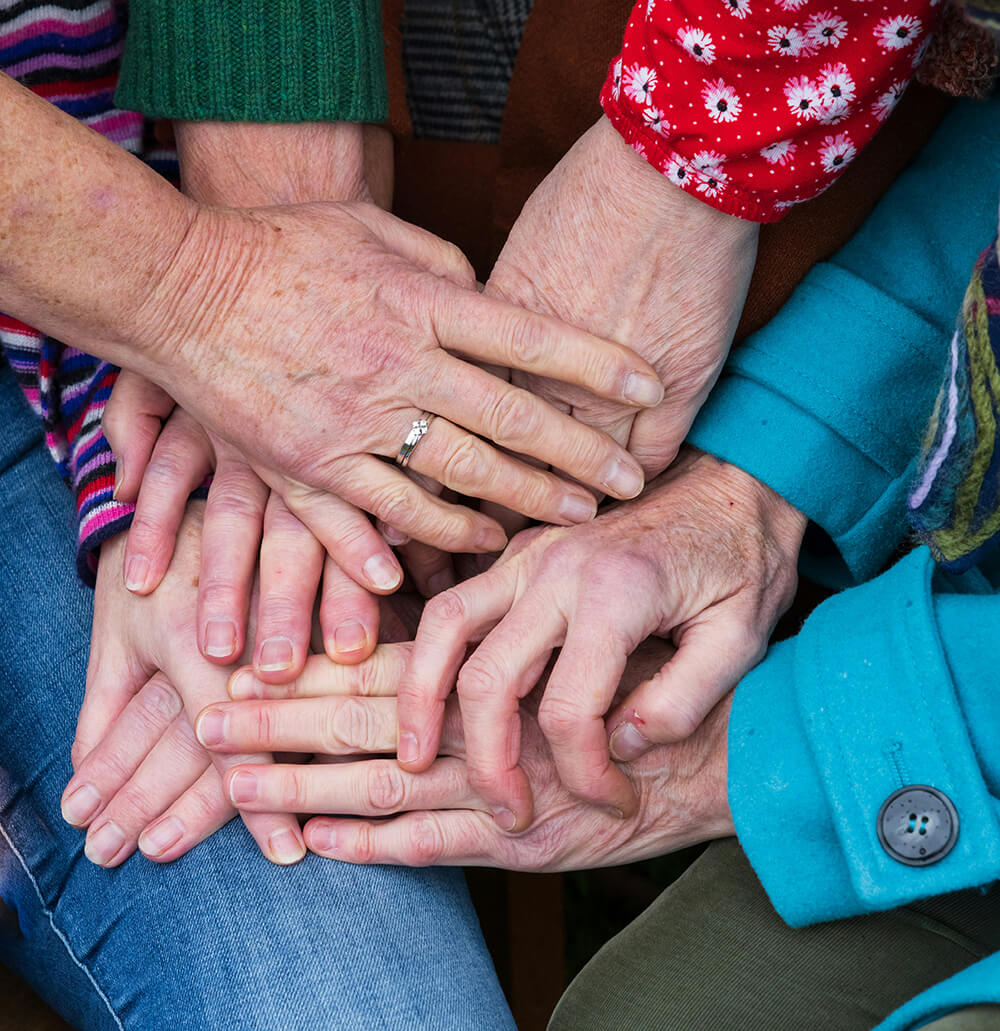 Staying active and engaged in the community is essential at any stage of life, but it becomes even more valuable as we age. It’s about staying physically healthy, mentally sharp, and socially connected. Whether it’s joining a hobby group, attending community events, or volunteering, getting involved in local activities can bring a renewed sense of purpose and improve overall well-being. In this blog, we explore local communities and the many benefits of involvement for the elderly and how small steps toward engagement can lead to a happier, healthier lifestyle.
Staying active and engaged in the community is essential at any stage of life, but it becomes even more valuable as we age. It’s about staying physically healthy, mentally sharp, and socially connected. Whether it’s joining a hobby group, attending community events, or volunteering, getting involved in local activities can bring a renewed sense of purpose and improve overall well-being. In this blog, we explore local communities and the many benefits of involvement for the elderly and how small steps toward engagement can lead to a happier, healthier lifestyle.
The Joy of Getting Involved: How Activities & Classes Enrich Life
Getting involved in local activities, clubs, and classes is one of the best ways to bring fun, purpose, and connection into everyday life. Whether it’s joining a book club, learning a new craft, taking up dance, or volunteering, participating in group activities keeps life exciting and fulfilling. Here are some of the amazing benefits:
1. Keeps Your Mind Sharp & Engaged
Learning something new—whether it’s a language, musical instrument, or creative hobby—keeps the brain active and engaged. This helps improve memory, problem-solving skills, and overall cognitive function while making learning an enjoyable and social experience.
2. Builds Meaningful Friendships
One of the greatest joys of joining a class or group is the friendships you make along the way. Shared interests create strong connections, and having a regular social circle reduces feelings of loneliness while adding more laughter and joy to life.
3. Boosts Happiness & Confidence
Trying something new and seeing yourself improve brings a fantastic sense of accomplishment. Whether it’s mastering a new skill or simply enjoying a fun activity, taking part in group sessions boosts self-esteem, positivity, and overall happiness.
4. Reduces Stress & Lifts Your Mood
Participating in enjoyable activities is a fantastic stress-reliever. Creative outlets like painting, music, or gardening help relax the mind, while social interactions and shared laughter naturally boost mood and reduce anxiety.
5. Creates Lifelong Memories & Experiences
Every new class, hobby, or group meeting brings the chance to create new memories, stories, and experiences. From learning to bake a new dish to performing in a local play, these moments add colour and excitement to life.

Local Communities
What is U3A?
The University of the Third Age (U3A) is a vibrant, community-led movement that offers lifelong learning and social opportunities for people in their later years. Designed for those who are retired or semi-retired, U3A provides a wide range of activities, from educational courses and creative workshops to social events and fitness groups. Unlike traditional universities, U3A focuses on peer-to-peer learning, where members share their knowledge and skills in a friendly, informal setting. With local groups across the UK and internationally, U3A is a fantastic way for older adults to stay mentally active, make new friends, and continue exploring their interests.
U3A aims to be as accessible as possible – classes are held in various locations. Groups meet either at somebody’s home, or in a room in a local library, church or community centre. U3A also has the option of joining virtually with people all over the world.
What is The Women’s Institute (WI)?
The Women's Institute is more than just a social club; it’s a thriving community that offers a wealth of benefits, particularly for elderly members. Joining the WI provides older individuals with an opportunity to stay socially connected, reducing the risk of loneliness and isolation—two key concerns in later life. With a diverse range of activities, including crafts, cooking, educational talks, and charity work, members can continue to learn new skills and stay mentally engaged. The WI also promotes physical well-being through group activities and events, encouraging members to stay active. Additionally, being part of a supportive and like-minded community can boost confidence, provide a sense of purpose, and create lasting friendships. Whether it's sharing stories over a cup of tea or contributing to local projects, the WI empowers elderly members to remain active, valued, and connected in their communities.
What are Rotary Clubs?
Rotary Clubs are global service organisations that bring together individuals who are passionate about making a difference in their communities. While Rotary is open to all ages, it offers significant benefits for elderly individuals looking to stay engaged, active, and socially connected. Many retirees join Rotary to continue using their skills and experience in meaningful ways, whether through charity work, mentoring, or organising community projects. Regular meetings provide opportunities to connect with like-minded people, reducing loneliness and fostering friendships. Rotary also promotes lifelong learning through guest speakers and workshops, keeping members mentally stimulated. For those who prefer a more social focus, Probus Clubs, an extension of Rotary, cater specifically to retired individuals by offering social events, trips, and networking opportunities without service commitments. Joining Rotary allows elderly members to stay involved and give back to their communities while enjoying a fulfilling and active lifestyle.
Find What Brings You Joy!
Whether it’s joining a book club, signing up for an art class, or participating in a local walking group, getting involved in activities enriches life in many ways. It’s all about having fun, meeting wonderful people, and making the most of every moment! So why not give something new a try? You might just discover a new passion that brings endless joy and fulfilment!
Heartfelt & Accessible Valentine’s Day Activities for the Elderly
Valentine’s Day is a wonderful opportunity to celebrate love and appreciation with those around us. Whether spending time with a partner, family, friends, or simply indulging in well-deserved self-care, there are many accessible ways to make the day special. Engaging in creative and heartwarming activities can enhance joy, spark cherished memories, and foster a sense of connection. From crafting handmade cards to baking delicious treats, here are some thoughtful and inclusive ways you can celebrate Valentine’s Day with ease and enjoyment.
1. Valentine’s Day Card Making - A Personal Touch
Handmade Valentine’s cards add a unique, personal touch to the holiday. Whether you’re making a card for a spouse, a dear friend, or a grandchild, this activity is both enjoyable and accessible with a few adaptations:
Use anti-slip mats – Tenura’s non-slip table mats keep paper and supplies steady, preventing slips while cutting or writing.
Adaptive grip tools – Tenura’s grip strips and rolls can be applied to markers or pens for a more comfortable grip.
A handmade Valentine’s card is a simple yet meaningful way to spread love while engaging in a creative and relaxing activity. There are so many ideas to choose from. You can even add embellishments and accessories, such as ribbons or lace, to enhance the personalisation.
2. Baking Sweet Valentine’s Treats - Made Easier
Baking is a heartwarming way to celebrate Valentine’s Day, filling the home with delicious aromas and nostalgia. Whether making heart-shaped cookies, cupcakes, or a simple sponge cake, here are some accessibility-friendly baking tips:
Non-slip kitchen aids: Tenura non-slip mats can be placed under mixing bowls to keep them stable while stirring, and jar openers can help open ingredient containers.
Bottle & Jar Openers– Tenura’s Bottle and Jar Openers can be a real time saver in the kitchen, reducing strain and difficulty so that you can thoroughly enjoy your Valentine's activities
Simple recipes – Look for easy-to-follow, minimal-prep recipes like no-bake cheesecakes or soft sugar cookies that don’t require excessive kneading or mixing.
Baking together can be a joyful bonding activity, whether with a partner, a friend, or even grandchildren who love decorating cookies with icing and sprinkles!
3. Simple DIY Valentine’s Decorations - Festive & Fun
Decorating for Valentine’s Day doesn’t have to be complicated! A few easy crafts can brighten up the space and bring joy:
Paper heart garlands – Using pre-cut paper hearts or crafting your own, simply string them together to create a festive garland!
Painted flower pots – Decorate small plant pots with heart designs and gift them with flowers or herbs. Using grip-enhancing brushes or wide-handled sponges makes painting more accessible.
Fabric crafts – Using felt or fabric scraps, you can make small heart-shaped pillows or scented sachets filled with lavender for a thoughtful homemade gift.
Crafting is not just fun—it also stimulates creativity and can be a great way to spend quality time with loved ones.
4. Valentine’s Day Memory Sharing - Reminiscing with Love
Valentine’s Day is also a time to reflect on cherished memories. A wonderful way to honour past and present love is by sharing stories.
Scrapbooking special moments – Collect old photos, letters, or memorabilia to create a Valentine’s scrapbook. Use Tenura cutlery grips to write letters and notes.
Memory-sharing game – Share funny or romantic stories with family, reliving past Valentine’s Days together and sparking nostalgia and joy.
Valentine’s Day is about celebrating love in its many forms, and with a few thoughtful adaptations, everyone can participate in the festivities. Whether crafting, baking, decorating, or reminiscing, these accessible activities allow everyone to enjoy the holiday in a meaningful and joyful way. The most important part of the celebration is the love and connection shared, making each moment special. No matter how you spend the day, embracing creativity and togetherness will ensure a genuinely heartfelt Valentine’s Day.
Nutrition and Health in the Context of Disability
Good nutrition is the foundation of a healthy, fulfilling life, but for individuals with disabilities, maintaining a balanced diet often requires overcoming unique hurdles. From physical limitations to sensory or cognitive challenges, these barriers can make something as simple as preparing a meal feel overwhelming. Yet, proper nutrition is essential—it fuels the body, supports independence, and reduces the risk of secondary health complications.
The good news? With the right tools, strategies, and support, these challenges can be transformed into opportunities for empowerment and growth. Whether this is with adaptive aids like Tenura products to make meal prep more accessible or leaning on caregivers and support networks for guidance, there are ways to ensure that everyone can enjoy the benefits of a nutritious diet. In this blog, we’ll explore how to navigate the intersection of nutrition, health, and disability to create a path toward better well-being for all.
Impact of Disabilities on Nutritional Needs
Disabilities can make even routine tasks like cooking and eating challenging. For some, physical limitations may restrict mobility, making shopping for groceries or preparing meals difficult. Cognitive or sensory impairments can add complexity, affecting planning and decision-making.
This is where Tenura products can make a real difference. Non-slip mats keep plates and kitchen tools stable, preventing spills, while Jar Openers and Cutlery Grips help overcome issues with reduced grip strength. These tools not only make meal preparation safer and more manageable but also empower individuals to regain some control and independence in the kitchen.
However, the challenges go beyond the kitchen. Barriers like store accessibility, limited adaptive cooking resources, or financial constraints can lead to unhealthy eating patterns or skipped meals. Addressing these obstacles with practical solutions can significantly improve dietary habits and health outcomes.
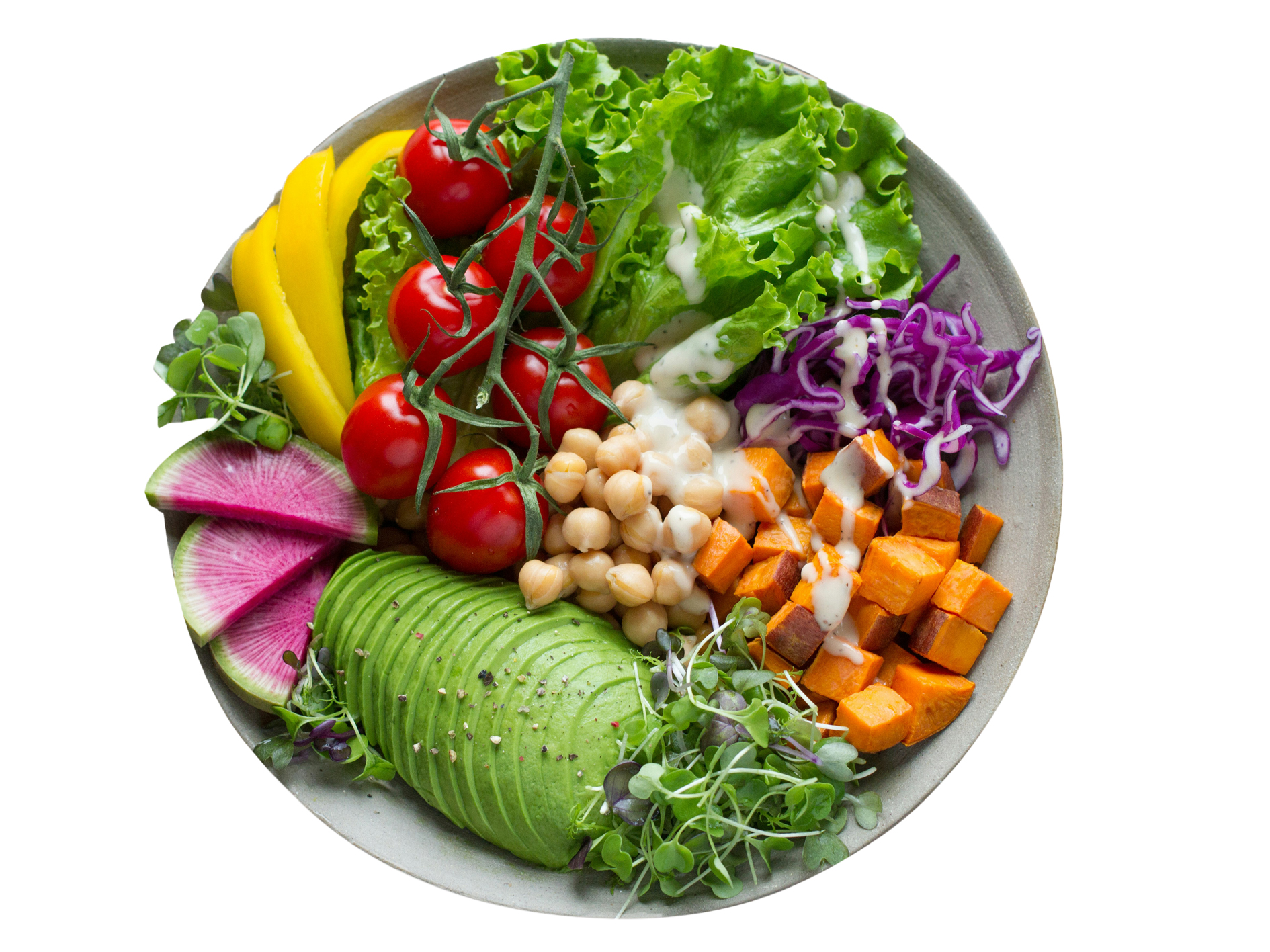 Strategies for Better Nutrition
Strategies for Better Nutrition
The path to better nutrition begins with simple, practical strategies tailored to individual needs. Meal planning can reduce stress and ensure balanced diets, while adaptive cooking tools and freezer-friendly meals save time and energy. Fortifying meals with nutrient-dense ingredients and preparing foods that are easier to chew or swallow can address specific dietary concerns.
Healthcare professionals, such as dietitians or occupational therapists, are invaluable allies in this journey. They can offer tailored advice, recommend adaptive tools, and create personalised nutrition plans that cater to unique needs. Collaborating with professionals ensures that nutritional solutions are both practical and sustainable.
The Role of Caregivers and Support Networks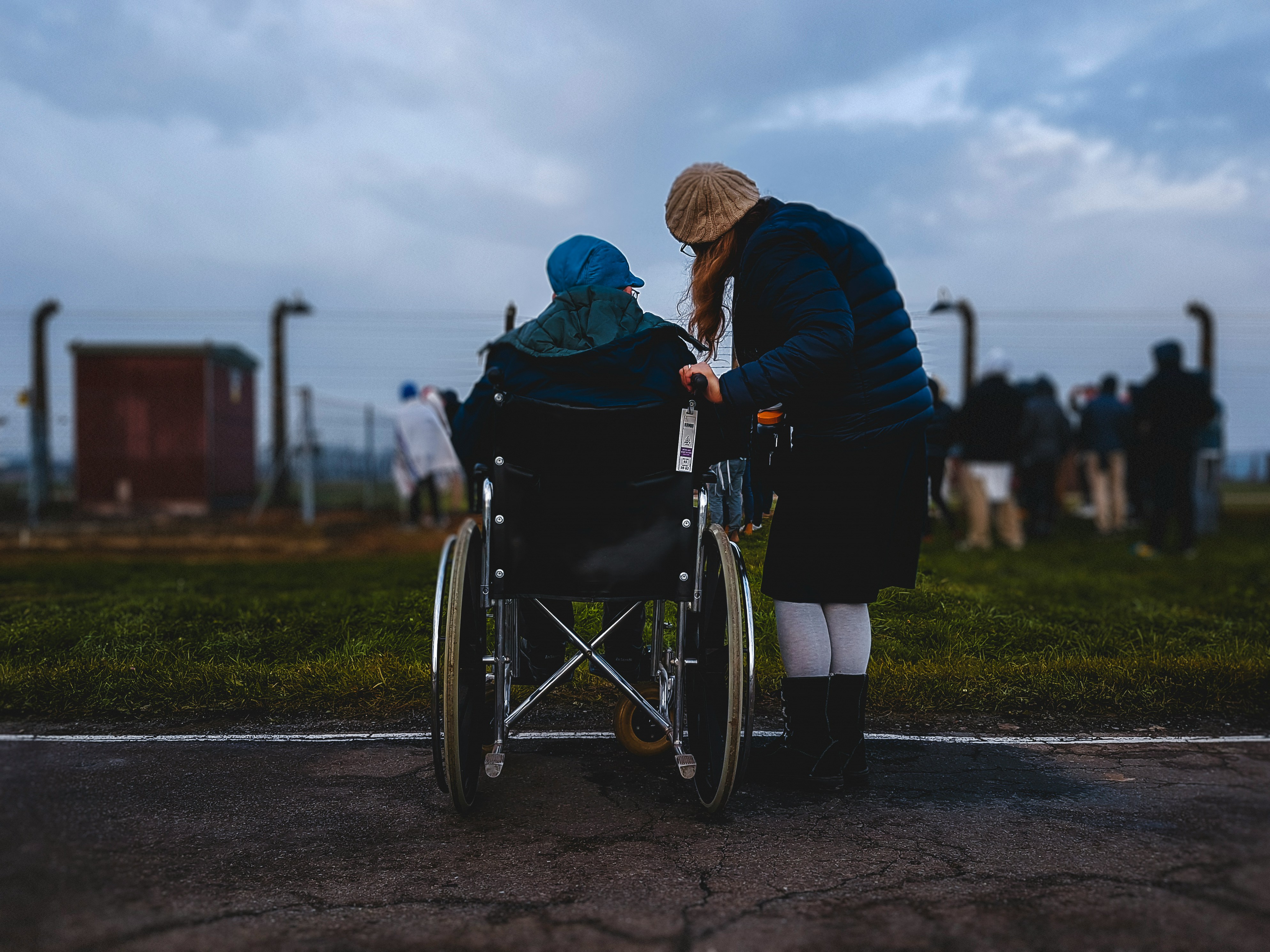
Caregivers and support networks are essential in helping individuals with disabilities maintain proper nutrition and overall well-being. They assist with meal planning, grocery shopping, and food preparation, ensuring dietary needs are met. Tenura products, like Cup Holders and Cutlery Grips, can further support caregivers by simplifying tasks and promoting safe, efficient assistance. Encouraging adaptive tools fosters greater independence, allowing individuals to participate actively in their meals where possible. A strong support network also provides emotional encouragement, helping to establish positive, sustainable eating habits.
To conclude...
Nutrition in the context of disability is about more than food; it’s about creating systems and environments that enable health, independence, and dignity. With the right tools, strategies, and support, individuals with disabilities can overcome barriers to good nutrition and enjoy a higher quality of life. Together, we can ensure everyone has access to the resources they need to thrive—because good nutrition should be accessible to all.
Regulatory Updates and Professional Standards
In the ever-evolving landscape of health and therapy, keeping up with the latest regulations, standards, and best practices is crucial for professionals committed to providing the highest level of care. This is particularly true when it comes to the use of disability aids. In this blog, we'll explore some recent regulatory updates, emerging professional standards, and best practices in the industry that you need to know.
The Importance of Staying Updated
Regulatory bodies continuously update their guidelines to ensure that healthcare products, including disability aids, meet the highest safety and efficacy standards. For professionals in the health and therapy sectors, staying informed about these changes. Compliance ensures that your products and services are safe, reliable, and practical, crucial for patient well-being and trust.
Recent Regulatory Updates
Post-Brexit CE Marking Adjustments
The UK's departure from the EU has led to significant changes in the regulatory landscape, particularly concerning CE marking. Now, disability aids in the UK require the UKCA marking (UK Conformity Assessed) to be sold legally. This shift necessitates that manufacturers and distributors of disability aids ensure their products comply with the new UK standards. Professionals need to verify that the aids they recommend or provide are properly certified.
 ISO Standards for Assistive Products
ISO Standards for Assistive Products
The International Organization for Standardization (ISO) periodically revises its standards for assistive products, ensuring they meet the latest technological advancements and safety requirements. The ISO 9999 classification, for example, is regularly updated to include new categories of assistive devices and refine existing classifications. Staying informed about these changes can help professionals recommend the most current and effective products to their clients.
Health and Care Professions Council (HCPC) Guidelines
The HCPC, which regulates health and care professionals in the UK, has updated its guidelines to emphasise the importance of continuous professional development in line with new standards and practices. For those specialising in occupational therapy, physiotherapy, or any field involving disability aids, adhering to these guidelines ensures that your practice remains aligned with the latest professional standards.
Emerging Best Practices in Disability Aids
Emphasising Individualised Care
The trend towards personalised medicine has reached the realm of disability aids, with a growing emphasis on tailoring products to individual needs. This approach improves patient outcomes and aligns with regulatory expectations for patient-centred care.
Sustainable and Ethical Practices
Sustainability is key in manufacturing and using disability aids. Professionals should be aware of products made from eco-friendly materials and companies that prioritise ethical manufacturing practices. Not only does this align with broader societal goals, but it also resonates with increasing clients who are conscious of their environmental footprint.
Integration of Smart Technology
Integrating intelligent technology into disability aids is an exciting development, offering enhanced functionality and greater user independence. Professionals should familiarise themselves with the latest intelligent aids, from sensors that monitor usage patterns to apps that allow for remote adjustments, ensuring they can have the familiar solutions for their clients.
Keeping up with regulatory updates and professional standards is essential for any health or therapy professional who works with disability aids. By staying informed, you not only ensure compliance but also enhance the quality of care you provide to your clients. The landscape is constantly changing, but with a commitment to learning and adaptation, you can remain at the forefront of your field, providing the best possible support to those who rely on your expertise.
Kitchen Innovations Cooking with Tenura Aids
In today's modern kitchen, efficiency, safety, and accessibility are essential for creating a pleasant cooking experience. Tenura's innovative range of daily living aids is designed to meet these needs, offering practical solutions that enhance comfort, promote independence, and improve overall kitchen functionality. Whether you're a professional chef, a passionate home cook, or someone with specific mobility challenges, Tenura products are crafted to make kitchen tasks easier and more enjoyable.
Enhancing Kitchen Accessibility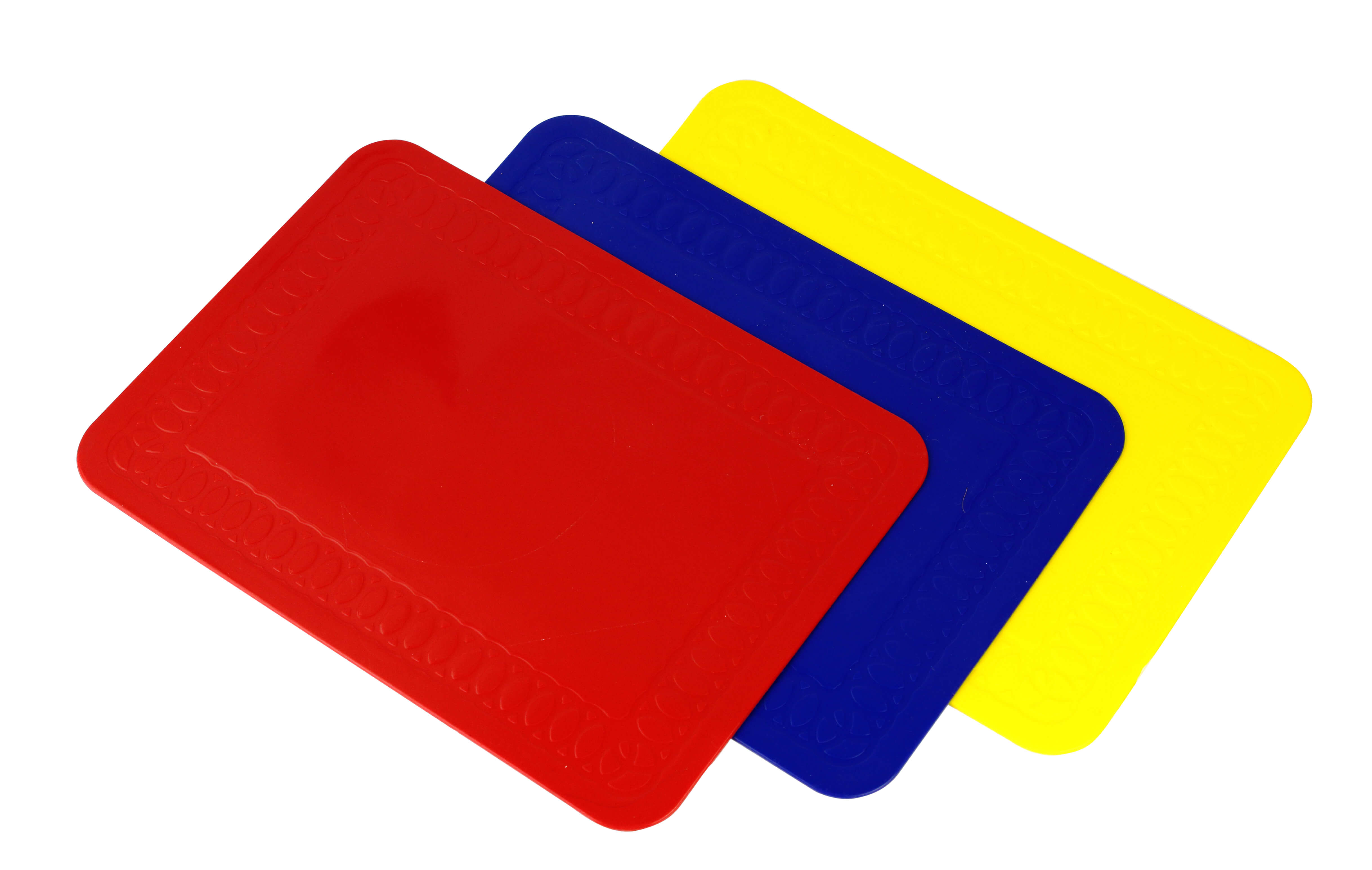
Tenura's non-slip mats and grip aids are crucial in maintaining stability and control during food preparation. These silicone-based mats adhere firmly to countertops, preventing items like cutting boards, bowls, and kitchen utensils from sliding or shifting. The heat-resistant properties of Tenura mats make them ideal for placing hot pots, pans, and dishes, ensuring safety while cooking. This stability enhances safety and boosts efficiency by allowing cooks to focus on their food without worrying about items slipping or moving unexpectedly.
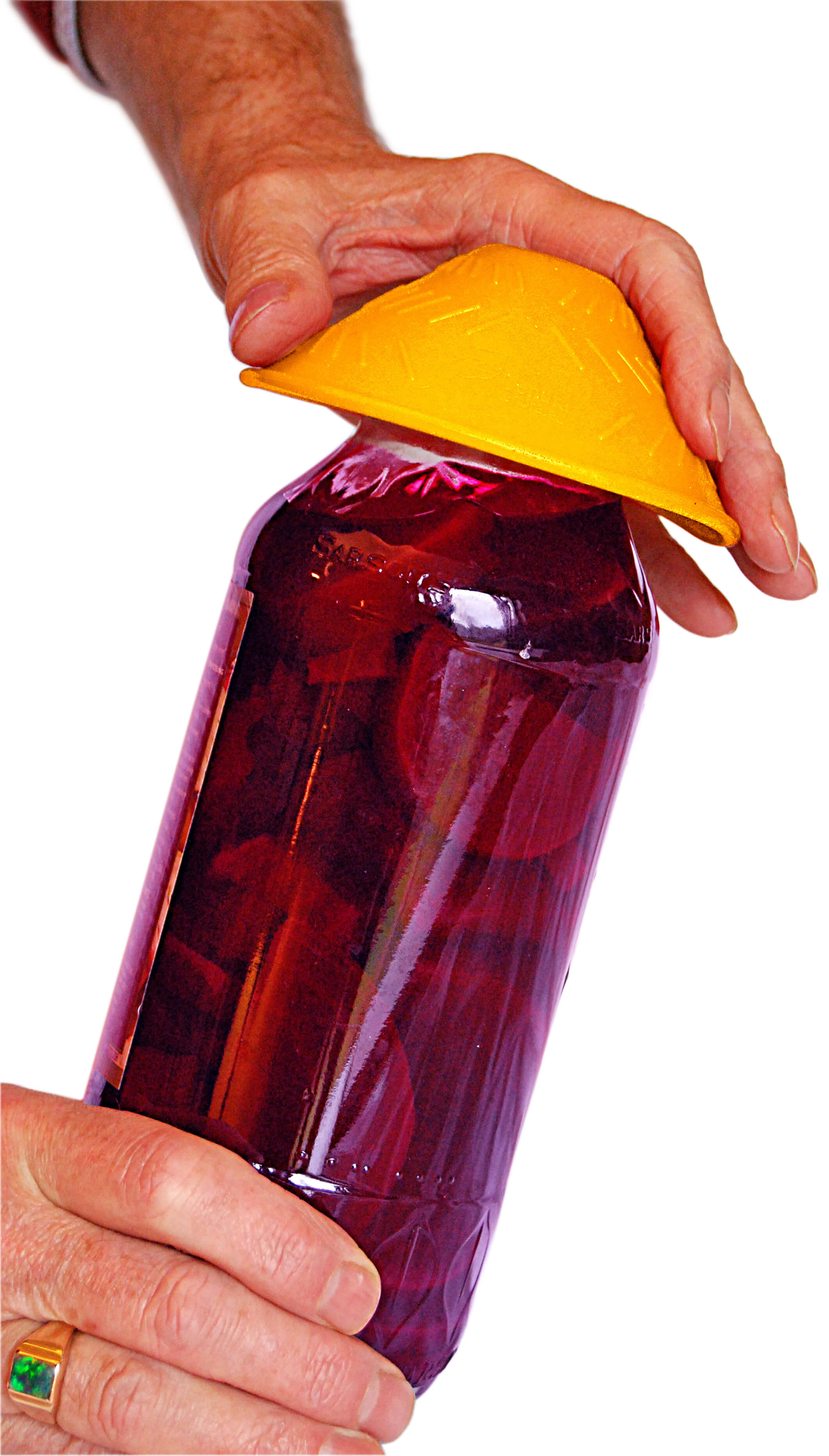 Supporting Comfort and Ergonomics
Supporting Comfort and Ergonomics
Cooking often involves repetitive motions and grip-intensive tasks, which can strain muscles and joints, especially for individuals with limited dexterity or strength. Tenura's jar openers and grip enhancers solve common kitchen challenges ergonomically. These aids help users effortlessly open bottles, jars, and containers of various sizes, reducing strain and discomfort. Tenura products enable users to maintain independence and enjoy cooking activities with greater ease by promoting a more comfortable grip and reducing the effort required for everyday tasks.
Promoting Safety in the Kitchen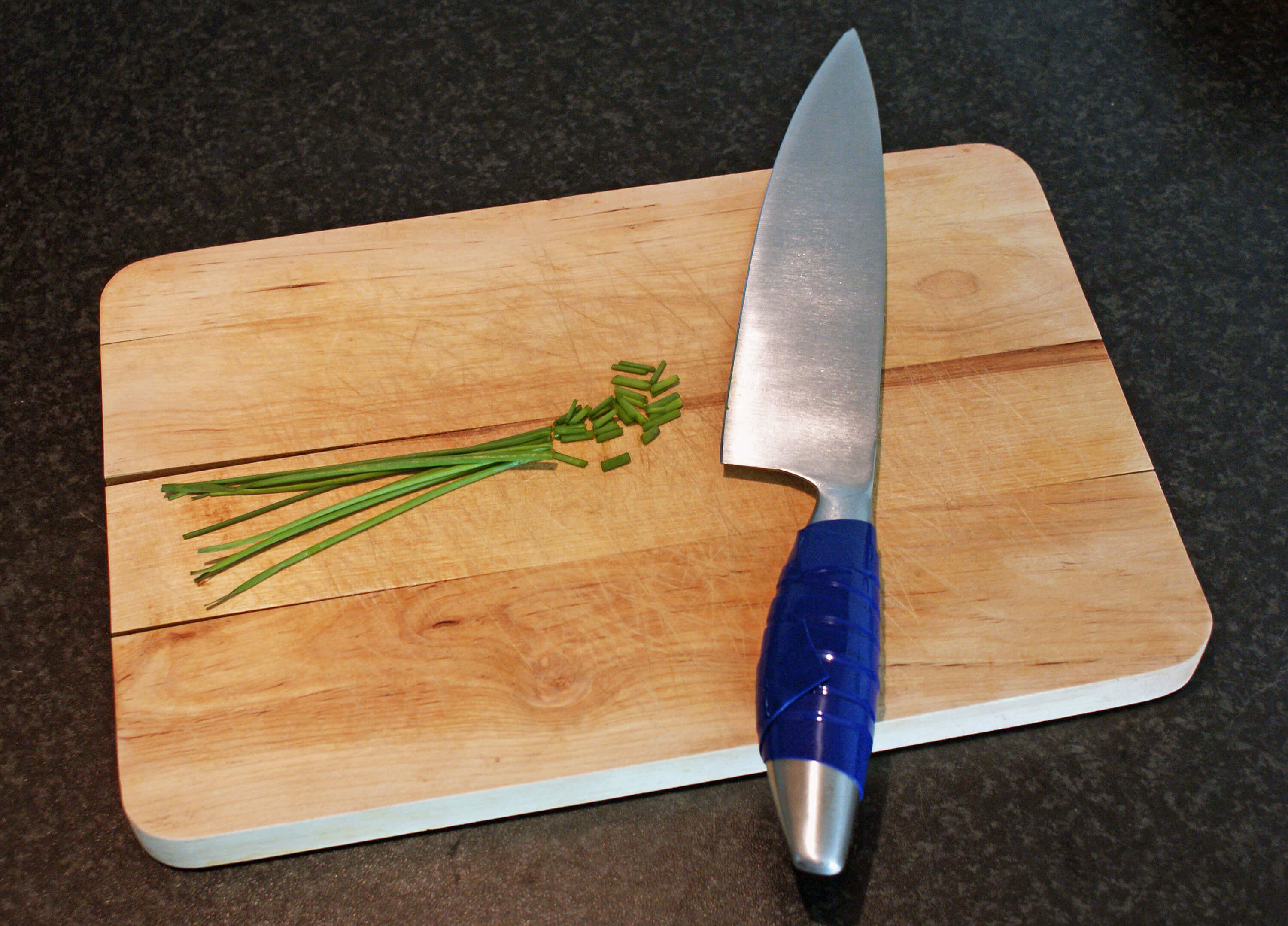
Safety is paramount in any kitchen environment. Tenura's anti-slip grip strips and coasters are designed to enhance safety by providing additional stability to utensils, small appliances, and tableware. These discreet yet effective solutions minimize the risk of accidents such as spills and slips, which are particularly useful in high-traffic areas of the kitchen where spills are more likely. By securing items firmly in place, Tenura products contribute to a safer cooking environment, giving users peace of mind as they go about their daily cooking routines.
Practical Applications and User Testimonials
The versatility of Tenura daily living aids extends beyond basic functionality, impacting users' lives in meaningful ways. Real-life applications demonstrate how these products have transformed kitchens globally, providing independence, improving efficiency, and enhancing overall quality of life. User testimonials highlight the positive impact of Tenura products, showcasing personal experiences of increased confidence, improved safety, and greater enjoyment in everyday cooking tasks.
Embracing Kitchen Innovations
Tenura daily living aids are more than just tools; they are innovations that empower users to embrace their culinary creativity while overcoming physical challenges. Whether you want to improve grip strength, enhance safety measures, or make cooking more comfortable, Tenura offers reliable solutions tailored to diverse needs. From professional kitchens to home settings, Tenura products are designed to foster independence and enhance the kitchen experience for users of all abilities.
As kitchen tools often change to meet the demands of modern living, Tenura remains at the forefront of innovation with its range of high-quality daily living aids. Integrating these products into your kitchen routine can enhance safety, improve efficiency, and enjoy a more comfortable cooking experience. Explore the full range of Tenura products today to learn how they can transform your kitchen into a space where independence and accessibility thrive.
Improving Rehabilitation with Tenura’s Products.
Physical therapy and rehabilitation play a crucial role in enhancing the lives of individuals recovering from injuries, surgeries, or managing chronic conditions. Occupational therapists and healthcare professionals often seek innovative and effective solutions to support their patient's recovery journey. In this blog, we'll explore how Tenura's range of anti-slip and grip products can be valuable tools for physical therapists and their patients, promoting safety, mobility, and independence during rehabilitation.
Tenura Grip Rolls
Secure Support for Therapeutic Exercises Tenura's grip rolls offer a versatile solution for physical therapists. These non-slip rolls can be cut to custom lengths and used to stabilise exercise equipment, therapy mats, and seating surfaces. By providing a secure grip, grip rolls enable patients to focus on their therapeutic exercises without worrying about slips or instability. Whether used under yoga mats during balance exercises or beneath resistance bands for strength training, grip rolls offer reliable support for targeted workouts.
 Non-Slip Floor Mats
Non-Slip Floor Mats
Fall Prevention and Gait Training For patients working on gait training or mobility exercises, non-slip floor mats are essential. Tenura's anti-slip floor mats provide a stable surface reducing the risk of falls during therapy sessions. These mats are particularly beneficial for individuals relearning how to walk or transitioning from a wheelchair to walking. Occupational therapists can incorporate these mats into exercises that challenge balance and coordination, fostering greater confidence in patients' mobility.
Tenura Jar & Bottle Openers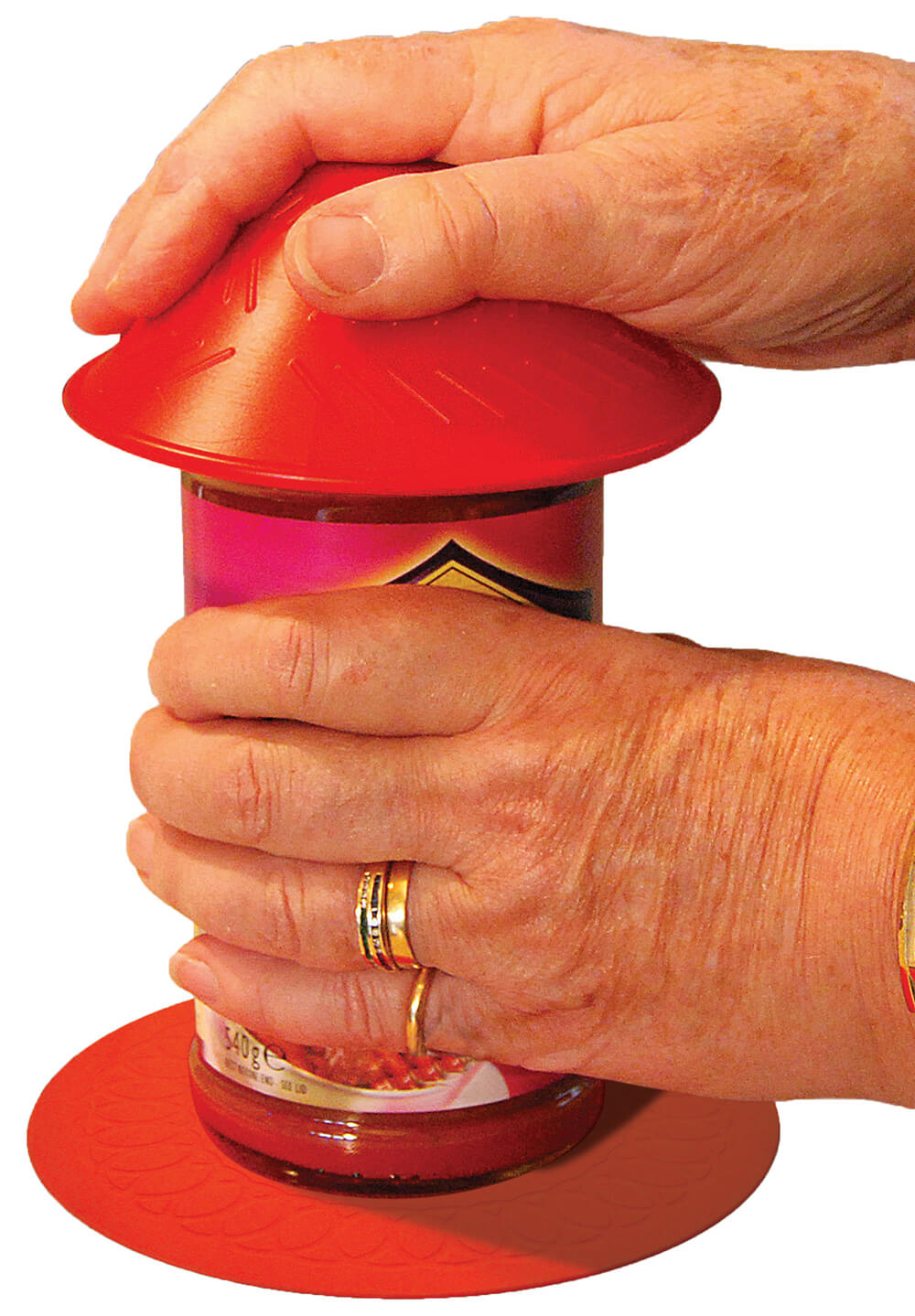
Regaining Independence in Daily Living Occupational therapists often work with patients to improve their activities of daily living (ADLs). Tenura jar and bottle openers can be valuable tools in this process, aiding patients with weak grip strength or limited hand mobility. These openers provide a firm grip on lids and caps, making it easier for patients to open containers and bottles independently. Empowering patients to perform everyday tasks can boost their self-esteem and enhance their overall well-being.
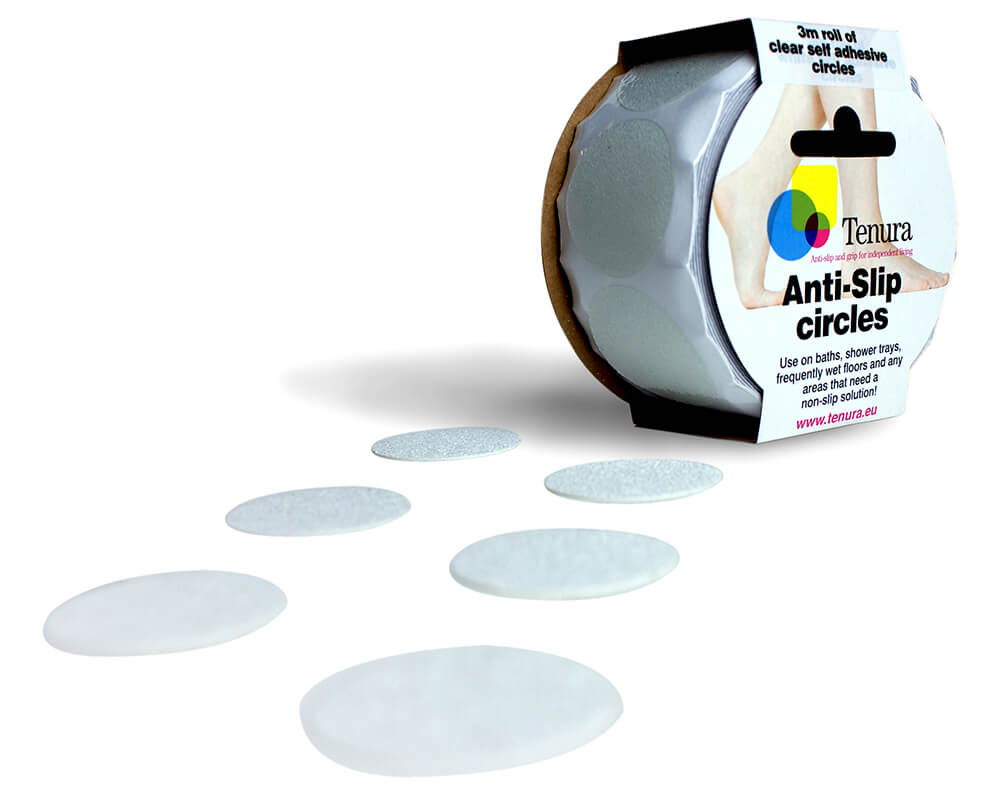 Non-Slip Bath & Shower Stickers
Non-Slip Bath & Shower Stickers
Promoting Safety and Confidence Safety is a top priority during rehabilitation, especially in the bathroom. Tenura's non-slip bath and shower stickers offer a practical solution for preventing slips in wet and slippery environments. Occupational therapists can recommend these stickers to patients, allowing them to shower and bathe with increased confidence. Enhanced bathroom safety can alleviate anxiety and encourage patients to maintain their personal hygiene routines without fear of accidents.
Tenura Grip Strips for Mobility Aids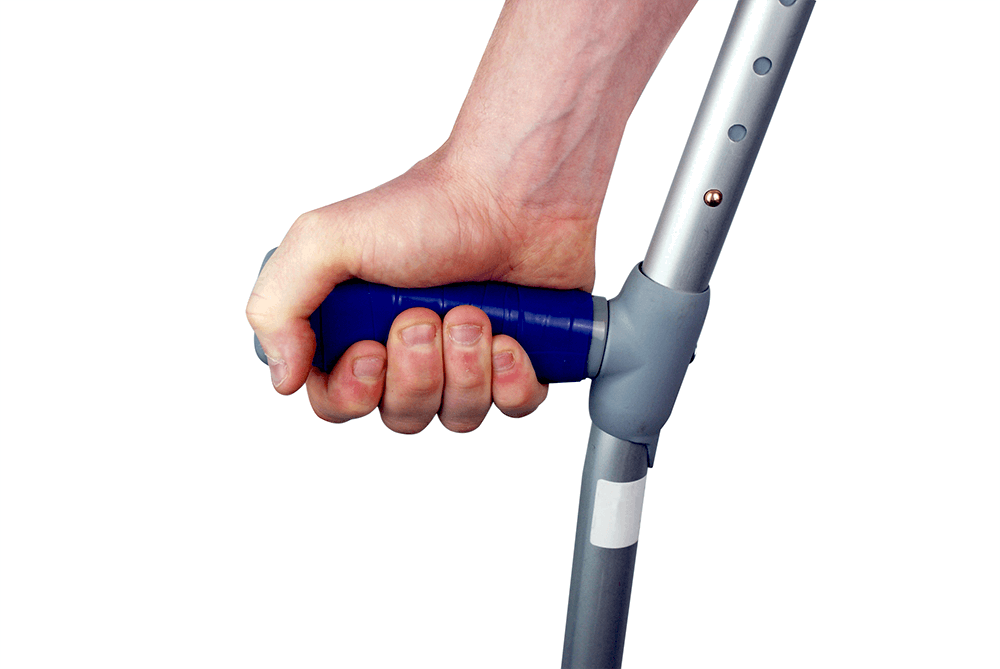
Secure and Steady Support Many patients rely on mobility aids such as canes, walkers, and wheelchairs during their recovery process. Tenura grip strips can be applied to these aids to enhance grip and stability. The non-slip surface helps prevent the mobility aid from slipping on smooth or uneven surfaces, enabling patients to move around more confidently. For individuals transitioning from using assistive devices to walking independently, these grip strips can facilitate a smoother journey towards increased mobility.
Tenura's range of anti-slip products offers valuable support to occupational therapists and their patients during physical therapy and rehabilitation. From grip rolls for therapeutic exercises to non-slip floor mats for fall prevention, Tenura equips therapists with versatile tools to enhance patient safety and independence. By incorporating Tenura products into rehabilitation programs, therapists can create a secure and empowering environment that fosters patients' recovery and mobility.
If you're an occupational therapist or healthcare professional, consider adding Tenura products to your toolkit to provide comprehensive support and care for your patients. Together, we can promote safer and more successful rehabilitation journeys, improving the lives of those on the path to recovery.
Typical Placemats Vs Tenura Placemats
When it comes to choosing placemats for your dining table, the options seem endless. From paper and cloth to stone and silicone, each material offers its own set of advantages and disadvantages. However, in recent years, silicone placemats, particularly those from Tenura, have gained popularity for their unique properties and benefits. In this blog post, we'll compare typical placemats to Tenura Placemats across various factors to help you make an informed decision.
 Environmental Impact:
Environmental Impact:
Typical Placemats: Paper and cloth placemats are often disposable or require frequent washing, leading to increased waste and water consumption. Stone placemats, while durable, may involve mining processes that can have significant environmental consequences.
Tenura Placemats: Tenura Placemats are made from high-quality silicone, a material known for its durability and recyclability. Unlike disposable options, Tenura Placemats are reusable, reducing the environmental footprint associated with single-use placemats.
Aesthetics:
Typical Placemats: Paper placemats offer a variety of designs and patterns but may lack durability. Cloth placemats provide a classic look and feel but can be prone to staining over time. Stone placemats offer a natural, rustic aesthetic but may not suit every dining table.
Tenura Placemats: Tenura Placemats combine functionality with sleek, modern design. Available in a range of colours and styles, they complement any table setting while offering the benefits of silicone, such as a non-slip grip and easy cleaning.
Toxicity:
Typical Placemats: Paper and cloth placemats are generally safe but may contain dyes or chemicals that could leach into food. Stone placemats are considered safe but may harbour bacteria if not properly cleaned and sanitized.
Tenura Placemats: Made from 100% silicone, Tenura Placemats are non-toxic and free from harmful chemicals such as BPA, PVC, and phthalates. They provide a safe dining surface for you and your family.
 Price:
Price:
Typical Placemats: Paper and cloth placemats are often inexpensive but may need frequent replacement. Stone placemats can be more expensive upfront but may offer better long-term value due to their durability.
Tenura Placemats: While Tenura Placemats may have a higher initial cost compared to disposable options, their durability and reusability make them a cost-effective choice in the long run.
Durability:
Typical Placemats: Paper placemats are disposable and have limited durability. Cloth placemats may fray or fade over time with repeated use and washing. Stone placemats are durable but may chip or crack with heavy use.
Tenura Placemats: Tenura Placemats are exceptionally durable and resistant to tearing, fading, and degradation. They maintain their non-slip properties even after prolonged use and are dishwasher safe for easy maintenance.
Size Options:
Tenura Placemats are available in the following sizes and weights:
25cm x 18cm | 76g
35cm x 25cm | 141g
45cm x 38cm | 306g
 Applications:
Applications:
Tenura Placemats have a wide range of uses beyond the dining table:
Prevent plates, bowls, and crockery from sliding on tables, counters, and trays.
Hold chopping boards in position for safer food preparation.
Secure kitchen appliances and mixing bowls in place during use.
Keep objects firm on surfaces that are not horizontal and/or are subject to motion or tipping.
Provide a safe resting place for hot pans on table mats, indicating to others that the pans are hot.
What is the Use of a Placemat?
A placemat is used to protect a dining table's surface from spills, stains, and heat damage while also enhancing the table's aesthetic appeal. It provides a designated area for placing dinnerware and serves as a barrier between the table and the dishes.
Why Do You Need Placemats?
Placemats serve multiple purposes, including protecting the dining table from damage, adding decorative elements to the table setting, and helping to define each diner's personal space during a meal. They also make cleaning up spills easier and can prevent dishes from sliding on the table.
What is the Difference Between a Table Mat and a Placemat?
The terms "table mat" and "placemat" are often used interchangeably, but there can be ever so slight differences in their usage. Generally, a placemat is a smaller, individual mat placed at each diner's setting, while a table mat refers to a larger mat placed in the centre of the table to protect the entire surface.
While typical placemats offer a range of options, Tenura Placemats stand out for their superior performance across various factors. From their eco-friendly composition to their stylish design and long-lasting durability, Tenura Placemats provide a reliable solution for enhancing your dining experience. Consider making the switch to Tenura Placemats for a practical and sustainable dining solution.
How to Choose a Pet That is Suitable for the Disabled
Choosing a pet can be a joyful and rewarding experience for anyone, but for individuals with disabilities, the process requires extra consideration. It's essential to select a pet that not only brings companionship and joy but also suits the specific needs and abilities of the disabled person. In this guide, we'll explore some key factors to keep in mind when choosing a pet for a disabled individual, along while discussing the best pets for disabled.
1. Consider the Physical Abilities of the Individual 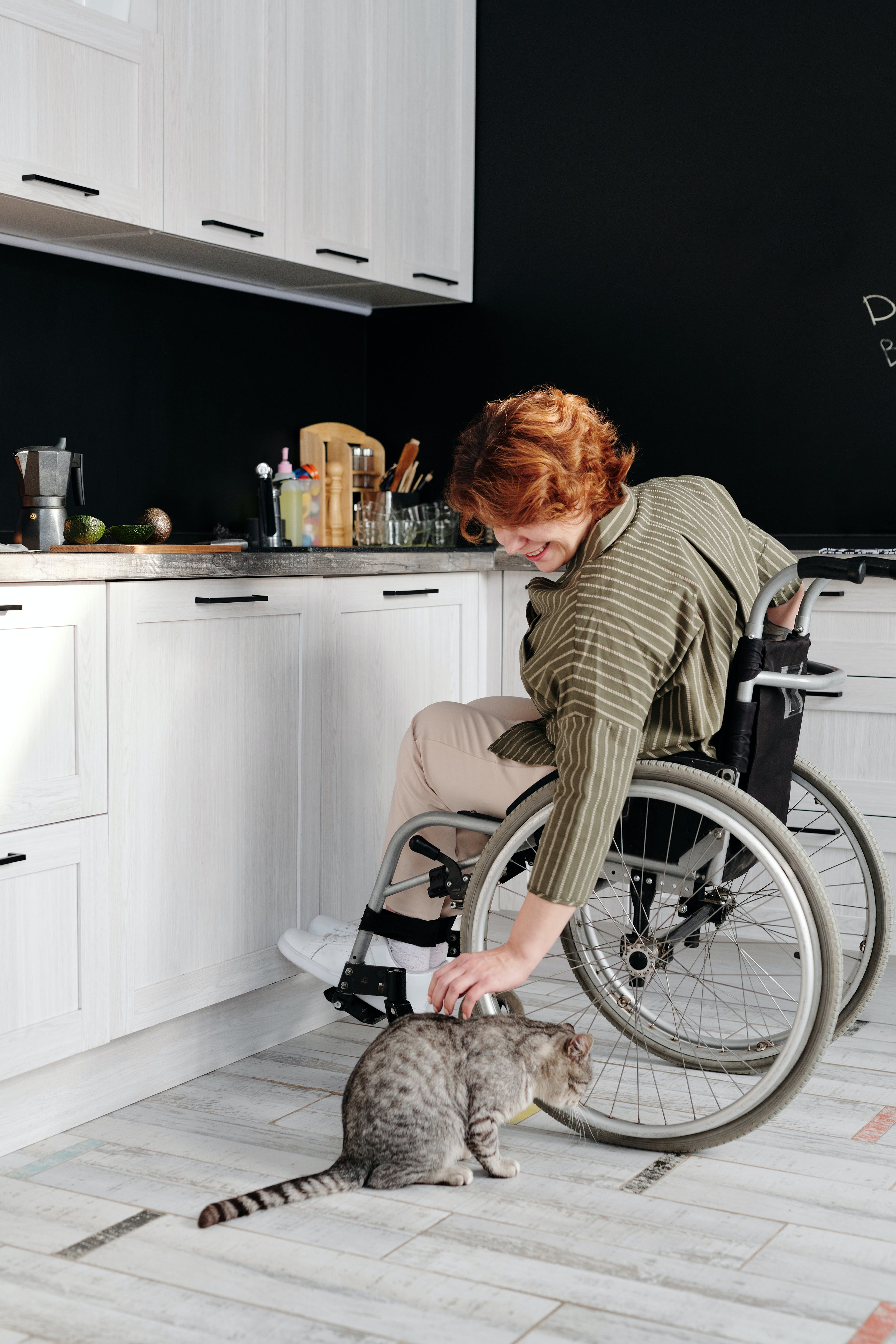
The first and most crucial step in choosing a pet for a disabled individual is to assess their physical abilities. Different disabilities have varying impacts on mobility and strength. For someone with limited mobility, a small and low-maintenance companion like a cat or a small dog may be a suitable choice. In contrast, individuals with more mobility may be able to care for larger dogs, which can offer both companionship and assistance.
2. Allergies and Sensitivities
People with disabilities might have allergies or sensitivities that can be triggered by pet dander, fur, or feathers. It's vital to consider these factors when choosing a pet. Hypoallergenic breeds or non-allergenic animals like reptiles and fish may be more appropriate for individuals with allergies or respiratory issues.
3. Energy Levels
The energy level of the pet should match the energy levels and abilities of the disabled person. High-energy dogs may be too demanding for someone with limited mobility. In such cases, consider lower-energy dog breeds or cats. Turtles, tortoises, or certain bird species can also be great options for people with a more laid-back lifestyle.
4. Training and Temperament
When choosing a pet for someone with a disability, it's important to consider the pet's temperament and its training requirements. Well-behaved, easy-to-train pets are often a better fit. Look for pets that are known for their gentle and patient nature, as these characteristics can make the pet-owner relationship more enjoyable and less stressful.
8. Financial Considerations
Owning a pet comes with financial responsibilities. It's important to consider the cost of food, veterinary care, grooming, and other pet-related expenses. Make sure that the individual or their support network can handle these costs comfortably. Although some health service providers can provide guide dogs which can assist you in areas of your disability.
6. Maintenance and Care
Consider the level of care and maintenance that the chosen pet will require. Disabled individuals might have varying levels of ability to care for their pets independently. Assess whether the individual can groom, feed, and clean up after the pet. If assistance is required, make sure there is a support system in place, with the Tenura product range we can help improve the maintenance for you and your companions with our range of daily living aids!
7. Housing and Space
Take into account the living situation of the disabled individual. Do they live in an apartment, a house, or a care facility? The available space will influence the choice of a pet. Smaller living spaces may be more suitable for cats, small dogs, or small mammals, whereas larger spaces can accommodate bigger dogs or even livestock in some cases.
8. Assistance Animals
Some disabled individuals require assistance animals to help with daily tasks. Service dogs, for instance, can be trained to perform tasks like fetching dropped items, opening doors, or providing emotional support. Ensure that you consult with a reputable service animal organisation to select and train a service dog that meets the specific needs of the disabled person.
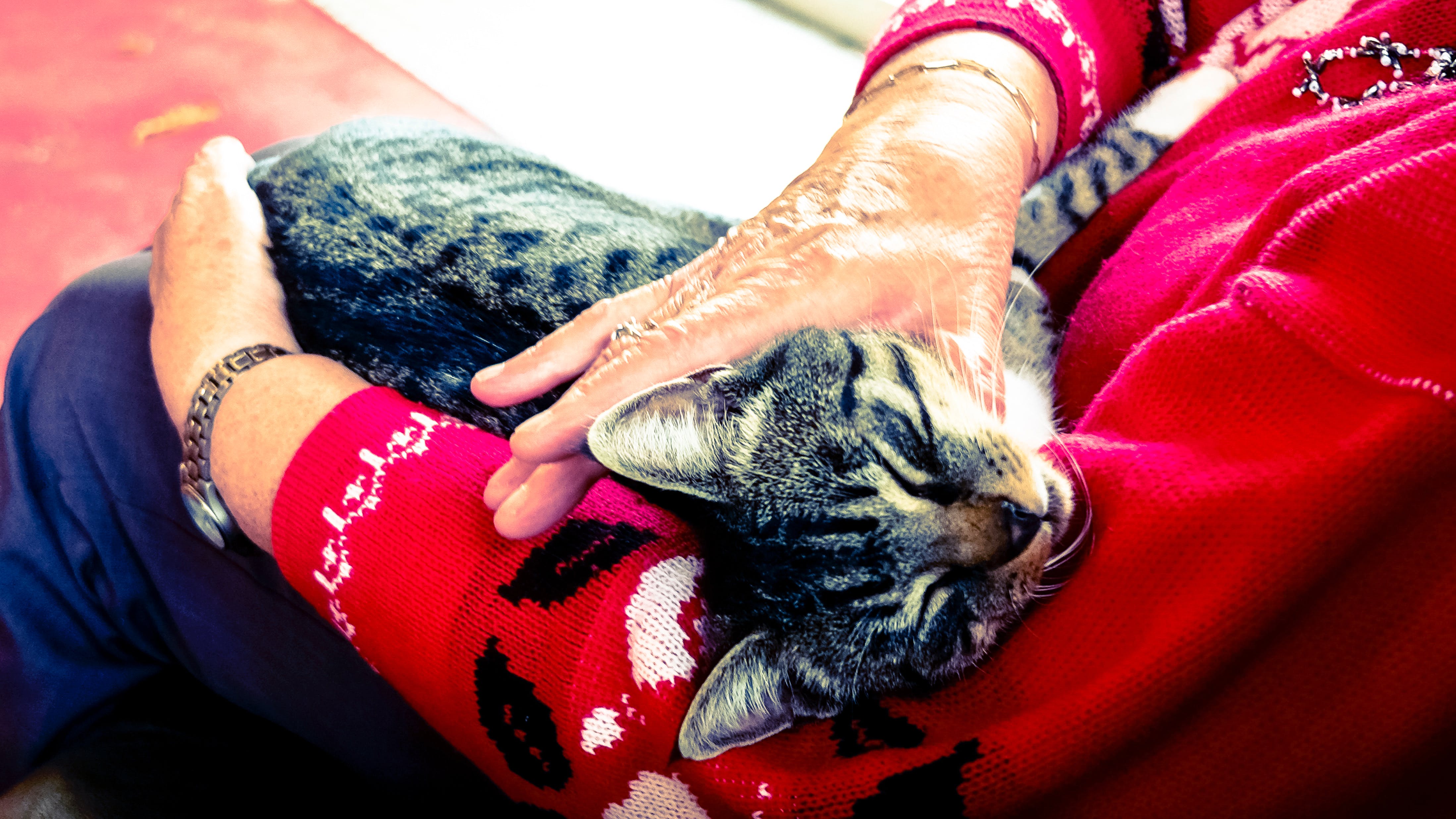
What Animals Can Be Used to Help The Disabled?
Cats and dogs are the most common animals used to assist people with disabilities. Dogs are highly versatile and can be trained to aid those with various disabilities, such as visual impairments, mobility challenges, and medical conditions like epilepsy or diabetes. Service dogs provide essential support by guiding their owners, retrieving items, and even alerting them to impending medical emergencies. Cats, although less commonly known as service animals, can offer valuable emotional support to individuals with disabilities. Their calming presence, companionship, and intuitive understanding of their owners' needs can be incredibly comforting. While dogs take on more active roles in assistance, cats excel in providing solace and emotional stability, making them essential companions for those with disabilities.
Can Animals Sense Disability?
Animals have a remarkable ability to sense disabilities in humans. Their acute senses and intuition enable them to detect physical and emotional changes in individuals. Many heartwarming stories and scientific studies have highlighted the incredible bond between animals and people with disabilities. Whether it's a service dog assisting someone with mobility challenges or a pet offering emotional support, these companions have an uncanny ability to understand and provide comfort to those in need. This unique connection between animals and individuals with disabilities is a testament to the profound sensitivity and empathy that our animal friends possess.
What Is The Best Dog Breed for Someone With a Disability?
When it comes to dog breeds for people with disabilities, several factors come into play. For individuals with mobility challenges, Labrador Retrievers, Golden Retrievers, and German Shepherds are often recommended as they are not only intelligent but also known for their gentle and helpful nature. However, the best dog breed ultimately depends on the specific needs and lifestyle of the disabled person. It's crucial to consult with a professional dog trainer or service dog organisation to make the right choice.
Choosing a pet for a disabled individual involves thoughtful consideration of their unique needs and abilities. The right pet can provide companionship, emotional support, and even assistance with daily tasks. By taking into account factors such as the individual's physical abilities, allergies, energy levels, temperament, and living situation, you can make a well-informed choice that will bring joy and fulfilment to both the person with a disability and their new furry or scaly friend. Learn more about animal therapy by reading our other blog.
If you're in need of daily living aids for a disabled individual, Tenura offers a range of high-quality products to improve daily life. To explore our offerings, please visit Tenura’s website.
Remember, the most crucial aspect of choosing a pet for someone with a disability is ensuring that the pet enhances their life, provides companionship, and supports their specific needs. Always consider the individual's comfort, safety, and happiness when making this important decision.
Tenura - Celebrating Purple Tuesday
What Is Purple Tuesday?
Purple Tuesday 2023, celebrated on the second Tuesday of November, is a global movement aimed at making businesses and organisations more accessible and inclusive for individuals with disabilities. At Tenura, we are dedicated to championing this cause. In this blog post, we'll explore the significance of Purple Tuesday, our commitment to accessibility, and how we're working towards a more inclusive world.
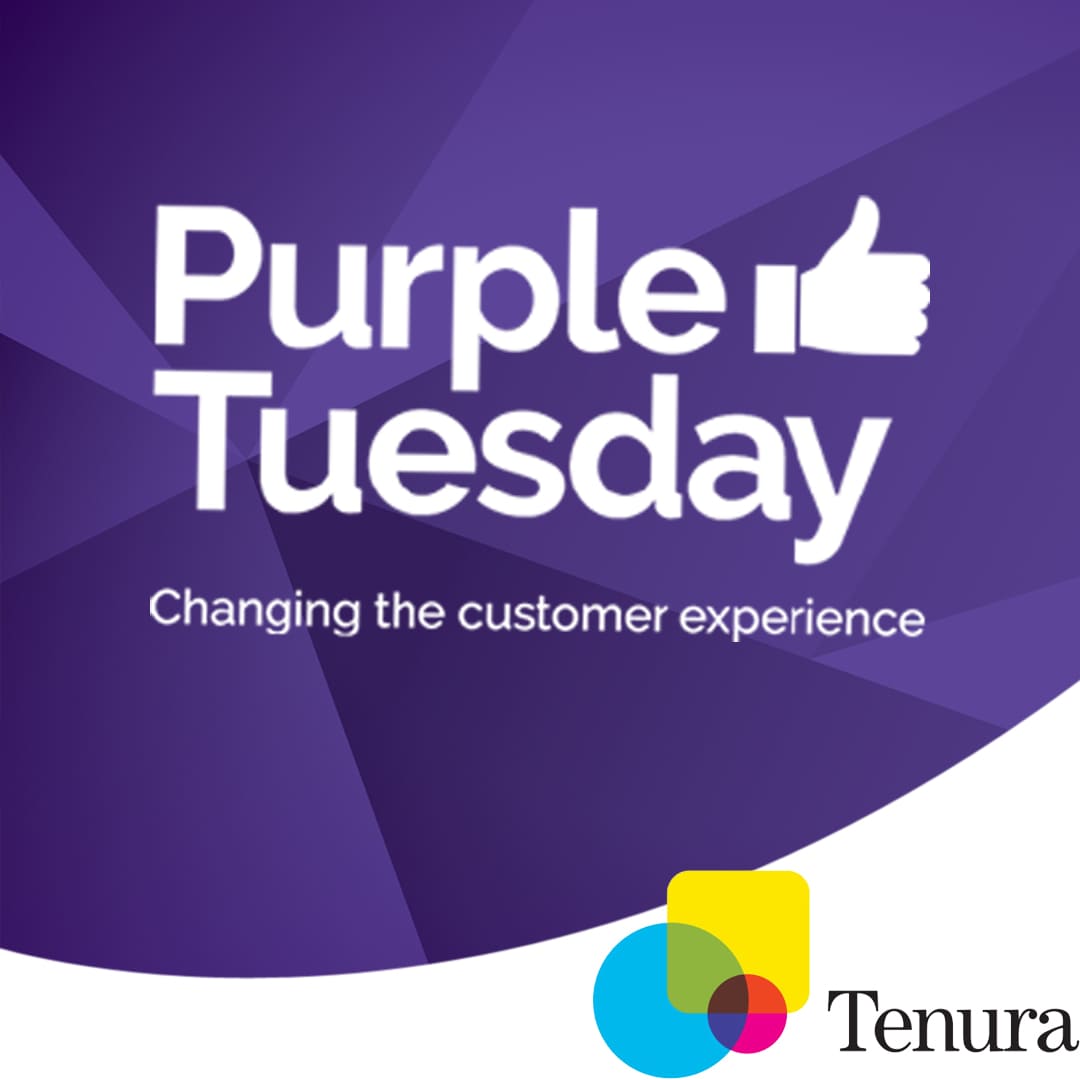
Why Purple Tuesday Matters:
Purple Tuesday is more than just a day on the calendar; it's a reminder of the essential role of accessibility and inclusivity in our society. It calls upon businesses to prioritise inclusivity and disability awareness to provide equal opportunities for all, regardless of their abilities or disabilities.
Tenura's Commitment:
At Tenura, we understand the importance of creating a world where everyone has equal access and opportunities. Our dedication to this cause goes beyond a single day, but Purple Tuesday serves as an annual milestone to reaffirm our commitment. Here are some of the steps we've taken and continue to take to support this mission:
- Accessible Products: We design and provide a range of innovative, anti-slip and grip-enhancing products that make everyday tasks more accessible for individuals with limited hand strength or mobility challenges.
- Educational Resources: We offer educational materials, tips, and guides to help individuals and caregivers create safer and more accessible living environments.
- Community Engagement: We collaborate with organisations and communities focused on accessibility and inclusivity, sharing insights and experiences to contribute to positive change.
- Feedback and Improvement: We actively seek feedback from our customers, users, and partners to improve our products and ensure they meet the evolving needs of the disability community.
Inclusivity for All:
Our vision is to empower individuals with disabilities, offering products and resources that enhance their daily lives and foster a sense of independence. By creating accessible solutions, we aim to remove the obstacles that limit opportunities and ensure that everyone can participate fully in their chosen activities and experiences.
As we observe Purple Tuesday, we recommit ourselves to the values of inclusivity and accessibility. At Tenura, our mission is to empower individuals and communities to lead fulfilling lives without limitations. Together, we can build a world where everyone, regardless of their abilities, can thrive. Join us on this journey, and let's make inclusivity an everyday reality.
Stay tuned for more updates, resources, and initiatives from Tenura as we work together for a more inclusive and accessible future.